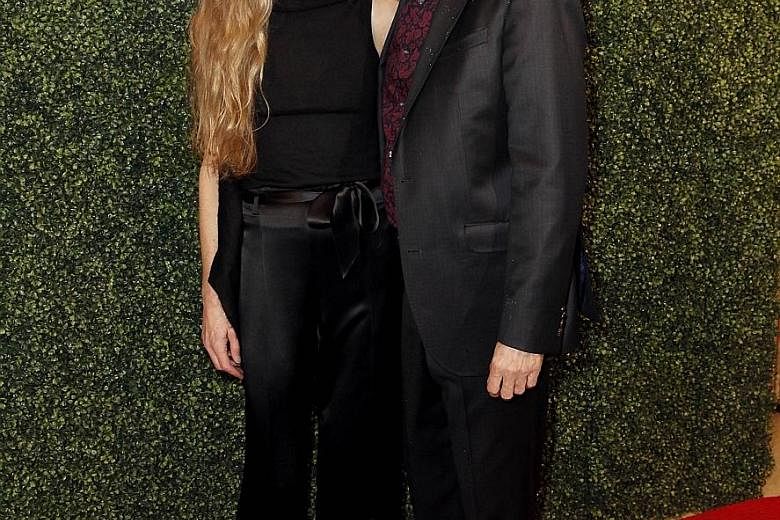NEW YORK • "Time management hell and no personal life" is how James Cameron described his existence these days in a telephone call from his studio in Manhattan Beach, California.
Who can blame him? In addition to working on four Avatar sequels, planning a reboot of the Terminator franchise and producing the big-ticket anime adaptation Alita: Battle Angel, due out in December, Cameron has a new documentary series.
Debuting yesterday on AMC, James Cameron's Story Of Science Fiction explores how the genre went from niche to mainstream, tracking its evolution through deep dives into the backstories and themes of landmark stories and films like War Of The Worlds (2005), Close Encounters Of The Third Kind (1977), Alien (1979) and, naturally, Avatar (2009).
Along the way, he interviews the creators and stars of those and other sci-fi films, including Steven Spielberg, Ridley Scott, George Lucas, Guillermo del Toro and Christopher Nolan.
While Cameron, 63, has seen enormous success outside of science fiction - see Titanic (1997) - a majority of his career has been dedicated to futuristic fantasies.
In an interview, he discussed the new series, 2001: A Space Odyssey (1968) and his updates of the Avatar and Terminator franchises.
What was the first science-fiction movie you ever saw?
That is a good question. That has been lost in the mists of time.
I would say probably something like Earth Vs. The Flying Saucers (1956) or 20 Million Miles To Earth (1957).
In terms of something memorable, it would be a black-and-white monster movie from the late 1950s or early 1960s.
This year marks the 50th anniversary of 2001: A Space Odyssey, which you credit as the movie that made you a film-maker. Why did it have such an impact?
What blew my mind was that a movie could be pure art, like a painting or a symphony. I was a movie fan but, to me, they were stories, entertainment. I didn't think of them as art and that was a big shift for me. It was the first time I ever thought to ask, "Who did this?"
And not only did I want to know who did it, but I also wanted to know how it was done. I wanted to study how that movie was made and that's what got me from being a fan to being a practitioner. I got a Super 8 camera. I started filming spaceship models. Then I started just filming anything - walking around town just shooting. Neon signs. Cars. Whatever.
You played a major role in sci-fi becoming the blockbuster genre it is today. Did shaping the AMC series feel like a memoir, evaluating your own career and impact?
No, we try to keep it away from that. I saw it more as giving something back to a genre that I loved and that I had been successful in.
And that was my pitch to the other film-makers. It's like, "Guys, we've all made a lot of money doing science fiction. Let's take casual science-fiction fans who don't know the literary underpinnings of the source materials and let's draw those roots back."
Whether it is going all the way back to Jules Verne or H.G. Wells, or the Golden Age classics of the 1940s and 1950s - you know, Arthur C. Clarke, Robert Heinlein and Theodore Sturgeon and writers like that. They all responded to that because they knew their own references. They said, "Yeah, we've got to do that." You are developing four Avatar sequels at the same time, which seems like an enormous undertaking. Why did you take that approach and how has it gone so far? It has been great. We basically went down and developed a pathway for the technology that would be amortised across four movies. And in parallel with that, I wrote the four scripts. And in parallel with that writing and pipeline development process, we also designed all four films.
We finitely designed movie two and three, meaning every single set, object, prop, setting, creature and blade of grass. We have broadly designed movies four and five, meaning all the main characters and main settings. So we're actually in really good shape.
The entire universe is well in focus for us and now we are just grinding through the actual production process. (We just had) our 100th day of performance-capture out of a 175-day schedule. That's two movies combined.
You may have seen some of the early scepticism about another Terminator reboot. How challenging is it to make this material seem fresh?
It is not a question of making it seem fresh. It is a question of making it fresh. The series has gotten kind of tired. I think it is by overuse of the same iconicity. So we are trying to break that mould. We are trying to make it also just, by the way, good storytelling with characters you care about, which I think has been missing for a while.
So when (producer) David Ellison came to me and said, "Let's do another one," I said, "All right, but I don't want to have to deal with reconciling all this (stuff) that happened in between. Can we just go back to Terminator 2 and carry on that timeline?"
He said, "Yeah, that sounds great."
NYTIMES

